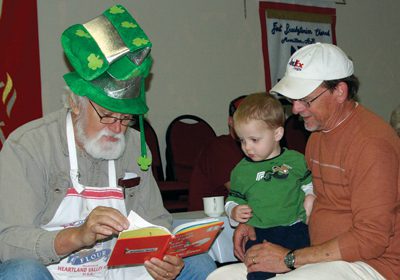By Renee Hunter
The Conway County Literacy Council’s primary goal is to meet clients’ immediate literacy needs, but it doesn’t stop there.
Immediate goals might include getting a driver’s license, reading the Bible, or getting a better job.

“We help them learn what they want to, not what we want them to,” said Tina McClure, the literacy council’s AmeriCorps volunteer.
“If they want to learn to read the Bible, we use that as their source material,” said Executive Director Angela Hammond.
Once the immediate need is met, students often choose to continue learning. For example, one client originally wanted help with reading the driver’s license manual so that she could get her license. She’s now working toward her GED and hopes eventually to attend college.
“She’s just so excited,” Angela said. “When a light bulb goes off like that, it makes you feel all warm and fuzzy.”
The client dropped out of school in the tenth grade to get married. She now visits the literacy council daily for tutoring in reading, spelling and math. “My reading and spelling have picked up wonderfully,” she said.
Another client came in for tutoring to improve her chance of obtaining a part-time census job. Now, while awaiting word from the U.S. Census Bureau, she is taking EMT training.
The Conway County illiteracy rate –those unable to read above fifth-grade level – is 24 percent, according to Angela. The problem is often generational because illiterate parents cannot help their children. Tina tutors three generations of one family together, and she tutors a mother who wants to improve her fourth-grade level reading skills so that she can help her school-age child when he moves into the higher grades.
People without basic skills are held down, Angela said. “Right now they’re washing cars; their job skills can be improved just by learning to read a ruler.”
Math tutor Stewart Nelson is currently teaching a student that very skill.
New students are pretested to discover their literacy levels and to aid in designing lesson plans. Post-testing monitors progress and aids the council in obtaining funding from federal and state governments and from Heart of Arkansas United Way, which supports health and human services organizations in Central Arkansas.
Students are referred from such diverse sources as the Department of Human Services, Department of Workforce, Pregnancy Resource Center, Conway County Detention Center and Dayspring Behavioral Health Services.
Since Angela became executive director in October, she and Tina have focused on raising awareness.
“I didn’t know we were here until I answered an ad for the job,” Angela said. She has discovered that many area residents are equally unaware, despite the council’s 22-year existence.
In addition to newspaper articles, fliers have been distributed, and Angela has spoken to several civic groups. Other “awareness” projects included manning a booth at Morrilton’s Martin Luther King Day event, and a “Green Eggs and Ham” breakfast at Morrilton’s First Presbyterian Church, with church members doing the cooking.
“Right now, the thing is awareness,” Angela said. “We go so people will know that we’re here.”
In November, designated literacy month, a raffle was held. “It wasn’t about the money,” Angela said. “People tend to listen to you if you have something to offer.” Several businesses donated prizes, and a booth was set up in front of Wal-Mart to sell tickets. The raffle also netted the council several new clients.
Tina regularly hands out business cards at restaurants, and has picked up several clients for her ESL (English as a Second Language) tutoring. Because Conway County’s Hispanic population is growing, so is the need for ESL classes. Currently, the council has 24 Hispanics being tutored in English.
“We are really, really growing,” Angela said.
However, the council has only 25 tutors, and could use many more. Interested volunteers receive training in tutoring methods, testing and filling out the necessary forms.
The latest council project is a very basic computer class, which starts with how to boot up the machine and moves from program to program. It is being offered for those who can’t keep up with the basic classes offered by Adult Ed. Students are able to work at their own pace instead of having to keep up with a class.
“Many mature students are afraid of the computer,” Angela said.
Members of the literacy council board are chairman Gordon Warren, vice chairman Jerry Collins, secretary/treasurer Stewart Nelson, Raymond Chambers, Kathleen Cambiano, Linda Smith and Don Shamise. They serve three-year terms and may serve only two consecutive terms. The council will be seeking a few new volunteers when the new fiscal year begins in June.

